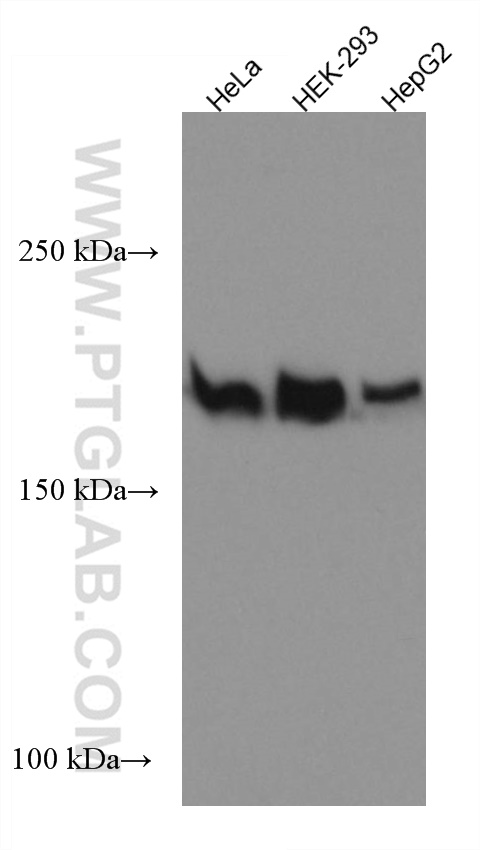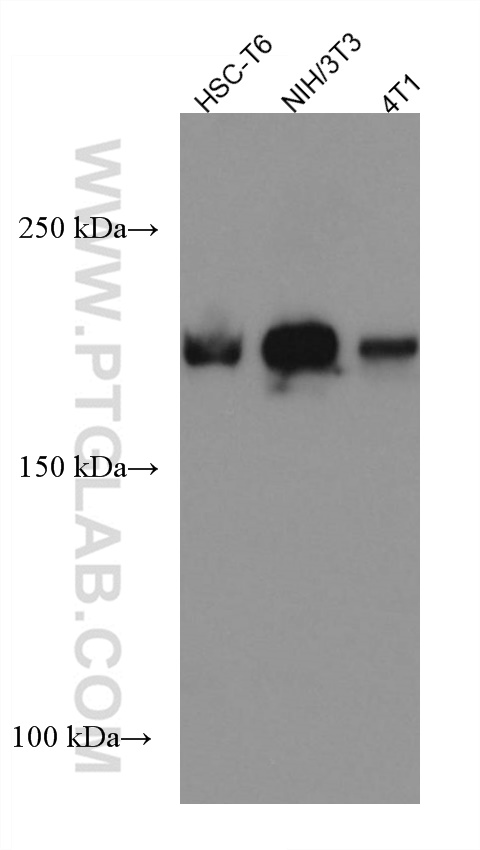验证数据展示
经过测试的应用
| Positive WB detected in | HeLa cells, HSC-T6 cells, HEK-293 cells, HepG2 cells, 4T1 cells, NIH/3T3 cells |
推荐稀释比
| 应用 | 推荐稀释比 |
|---|---|
| Western Blot (WB) | WB : 1:1000-1:6000 |
| It is recommended that this reagent should be titrated in each testing system to obtain optimal results. | |
| Sample-dependent, Check data in validation data gallery. | |
产品信息
67296-1-Ig targets DOCK1 in WB, ELISA applications and shows reactivity with Human, mouse, rat samples.
| 经测试应用 | WB, ELISA Application Description |
| 经测试反应性 | Human, mouse, rat |
| 免疫原 | DOCK1 fusion protein Ag18069 种属同源性预测 |
| 宿主/亚型 | Mouse / IgG2a |
| 抗体类别 | Monoclonal |
| 产品类型 | Antibody |
| 全称 | dedicator of cytokinesis 1 |
| 别名 | ced5, dedicator of cytokinesis 1, DOCK1, DOCK180 |
| 计算分子量 | 1865 aa, 215 kDa |
| 观测分子量 | 215 kDa |
| GenBank蛋白编号 | BC146857 |
| 基因名称 | DOCK1 |
| Gene ID (NCBI) | 1793 |
| RRID | AB_2882560 |
| 偶联类型 | Unconjugated |
| 形式 | Liquid |
| 纯化方式 | Protein A purification |
| UNIPROT ID | Q14185 |
| 储存缓冲液 | PBS with 0.02% sodium azide and 50% glycerol , pH 7.3 |
| 储存条件 | Store at -20°C. Stable for one year after shipment. Aliquoting is unnecessary for -20oC storage. |
背景介绍
DOCK1, also named as DOCK180, belongs to the DOCK family. It is involved in cytoskeletal rearrangements required for phagocytosis of apoptotic cells and cell motility. DOCK1 functions as a guanine nucleotide exchange factor (GEF), which activates Rac Rho small GTPases by exchanging bound GDP for free GTP. Its GEF activity may be enhanced by ELMO1
实验方案
| Product Specific Protocols | |
|---|---|
| WB protocol for DOCK1 antibody 67296-1-Ig | Download protocol |
| Standard Protocols | |
|---|---|
| Click here to view our Standard Protocols |

